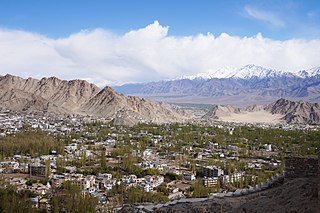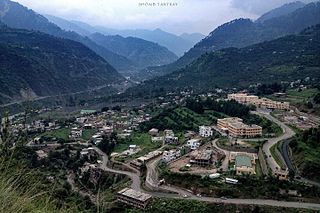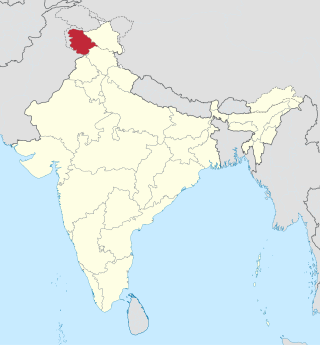Related Research Articles

Srinagar is a city in Indian-administered Jammu and Kashmir in the disputed Kashmir region. It is the largest city and summer capital of Jammu and Kashmir, which is an Indian-administered union territory. It lies in the Kashmir Valley along the banks of the Jhelum River, and the shores of Dal Lake and Anchar Lakes, between the Hari Parbat and Shankaracharya hills. The city is known for its natural environment, various gardens, waterfronts and houseboats. It is also known for traditional Kashmiri handicrafts like the Kashmir shawl, papier-mâché, wood carving, carpet weaving, and jewel making, as well as for dried fruits. It is the second-largest metropolitan area in the Himalayas.

Leh is a city in Ladakh in the Kashmir region. It is the largest city and the joint capital of Ladakh. Leh, located in the Leh district, was also the historical capital of the Kingdom of Ladakh. The seat of the kingdom, Leh Palace, the former residence of the royal family of Ladakh, was built in the same style and about the same time as the Potala Palace in Tibet. Since they were both constructed in a similar style and at roughly the same time, the Potala Palace in Tibet and Leh Palace, the royal residence, are frequently contrasted. Leh is at an altitude of 3,524 m (11,562 ft), and is connected via National Highway 1 to Srinagar in the southwest and to Manali in the south via the Leh-Manali Highway.

The Srinagar District is an administrative district of Indian-administered Jammu and Kashmir in the disputed Kashmir region. It is one of the 20 districts of Jammu and Kashmir. Situated in the centre of the Kashmir Valley, it is the second-most populous district of the union territory after Jammu District as per the 2011 national census, and is home to the summer capital city of Srinagar. Likewise, the city of Srinagar also serves as the Srinagar District's headquarters.

The Kashmir conflict is a territorial conflict over the Kashmir region, primarily between India and Pakistan, and also between China and India in the northeastern portion of the region. The conflict started after the partition of India in 1947 as both India and Pakistan claimed the entirety of the former princely state of Jammu and Kashmir. It is a dispute over the region that escalated into three wars between India and Pakistan and several other armed skirmishes. India controls approximately 55% of the land area of the region that includes Jammu, the Kashmir Valley, most of Ladakh, the Siachen Glacier, and 70% of its population; Pakistan controls approximately 30% of the land area that includes Azad Kashmir and Gilgit-Baltistan; and China controls the remaining 15% of the land area that includes the Aksai Chin region, the mostly uninhabited Trans-Karakoram Tract, and part of the Demchok sector.

Leh district is a district in Indian-administered Ladakh in the disputed Kashmir-region. Ladakh is an Indian-administered union territory. With an area of 45,110 km2, it is the second largest district in the country, second only to Kutch. It is bounded on the north by Gilgit-Baltistan's Kharmang and Ghanche districts and Xinjiang's Kashgar Prefecture and Hotan Prefecture, to which it connects via the historic Karakoram Pass. Aksai Chin and Tibet are to the east, Kargil district to the west, and Lahul and Spiti to the south. The district headquarters is in Leh. It lies between 32 and 36 degree north latitude and 75 to 80 degree east longitude.

Kargil or Kargyil is a city in Indian-administered Ladakh in the disputed Kashmir region. It is the joint capital of Ladakh, an Indian-administered union territory. It is also the headquarters of the Kargil district. It is the second-largest city in Ladakh after Leh. Kargil is located 204 kilometres (127 mi) east of Srinagar in Jammu and Kashmir, and 234 kilometres (145 mi) to the west of Leh. It is on the bank of the Suru River near its confluence with the Wakha Rong river, the latter providing the most accessible route to Leh.
The following is a timeline of the Kashmir conflict, a territorial conflict between India, Pakistan and, to a lesser degree, China. India and Pakistan have been involved in four wars and several border skirmishes over the issue.

Sheikh Rasheed Ahmad is a Pakistani politician who served as the 38th Interior Minister of Pakistan in Imran Khan government from 2020 to 2022. He is the founder and leader of Awami Muslim League, and also maintains close relations with the political party Pakistan Tehreek-e-Insaf.

Kupwara district is an administrative district of Indian-administered Jammu and Kashmir in the disputed Kashmir region. It is one of the 10 districts located in the Kashmir Valley Division of Indian administered Kashmir. The Pohru River and Mawar river are two main rivers in the district. Both of them meet Jhelum river in Baramulla district.

Ramban district is an administrative district in the Jammu division of Indian-administered Jammu and Kashmir in the disputed Kashmir region. It is located in a valley surrounded the Pir Panjal range. It was carved out as a separate district from erstwhile Doda district in 2007. It is located in the Jammu division. The district headquarters are at Ramban town, which is located midway between Jammu and Srinagar along the Chenab river in the Chenab valley on National Highway-44, approximately 151 km from Jammu and Srinagar.
Transport between India and Pakistan has been developed for tourism and commercial purposes and bears much historical and political significance for both countries, which have possessed few transport links since the partition of India in 1947. In 2019, all public transport links between the two countries were severed because of Pakistani protest at India's revocation of the special status of Jammu and Kashmir. The only way for travelers to make this journey is to cross on foot at Wagah.

Gilgit-Baltistan, formerly known as the Northern Areas, is a region administered by Pakistan as an administrative territory and consists of the northern portion of the larger Kashmir region, which has been the subject of a dispute between India and Pakistan since 1947 and between India and China since 1959. It borders Azad Kashmir to the south, the province of Khyber Pakhtunkhwa to the west, the Wakhan Corridor of Afghanistan to the north, the Xinjiang region of China to the east and northeast, and the Indian-administered union territories of Jammu and Kashmir and Ladakh to the southeast.

Soura, known as Sovur in Kashmiri, is a neighborhood in Indian-administered Srinagar in the disputed region of Jammu and Kashmir. It is located about 9 km north of Lal Chowk, Srinagar on Srinagar-Ladakh Highway in Jammu and Kashmir, India. Soura is noted for Sher-i-Kashmir Institute of Medical Sciences, a multi-specialty hospital. Besides serving as a hospital, it is the medical deemed university of Kashmir valley. Soura is located near Anchar Lake. The whole western side of the area is covered by Anchar Lake. It also hosts a famous Muslim Shrine known as Asar-e-Sharif Jinab Sahib Soura which holds more than 13 holy relics.

Media in Jammu and Kashmir comprises a diverse landscape of print, electronic and digital media outlets. The region is served by a variety of newspapers, television channels, radio stations, and online news platforms, reflecting the cultural and linguistic diversity of the area.

Jammu and Kashmir is a region administered by India as a union territory and consists of the southern portion of the larger Kashmir region, which has been the subject of a dispute between India and Pakistan since 1947 and between India and China since 1959. The Line of Control separates Jammu and Kashmir from the Pakistani-administered territories of Azad Kashmir and Gilgit-Baltistan in the west and north. It lies to the north of the Indian states of Himachal Pradesh and Punjab and to the west of Ladakh which is administered by India as a union territory.

The Jammu and Kashmir Reorganisation Act, 2019 is an act of the parliament of India containing provisions to reconstitute the Indian-administered state of Jammu and Kashmir into two Indian-administered union territories (UTs) called Jammu and Kashmir, and Ladakh, and becoming effective on 31 October 2019. A bill for the act was introduced by the Minister of Home Affairs, Amit Shah, in the Rajya Sabha on 5 August 2019 and was passed on the same day. It was then passed by the Lok Sabha on 6 August 2019 and it received the president's assent on 9 August 2019.

On 5 August 2019, the Government of India revoked the special status, or autonomy, granted under Article 370 of the Indian Constitution to Jammu and Kashmir—a region administered by India as a state which consists of the larger part of Kashmir which has been the subject of dispute among India, Pakistan, and China since 1947.

The 2019–2021 Jammu and Kashmir lockdown was a preventive security lockdown and communications blackout that had been imposed throughout the Indian-administered union territory of Jammu and Kashmir following the revocation of Article 370 which lasted until February 2021, with the goal of preemptively curbing unrest, violence and protests. Most separatist leaders had and have been detained in the crackdown. The Indian government had stated that the tough lockdown measures and substantially increased deployment of security forces had been aimed at curbing terrorism. The government did not want a repeat of the death and injuries seen during the 2016–2017 Kashmir unrest.
Youm-e-Istehsal is a day observed in Pakistan on 5 August every year as a reaction to the Revocation of the special status of Jammu and Kashmir. The Government of Pakistan subsequently designated 5 August to be observed as the Youm-e-Istehsal annually since 2020.
The following is a list of railway border crossings of Pakistan. Pakistan Railways operates passenger and freight services with its neighboring countries. Some of the railway lines and services are operational, while others are non-operational or in proposal or planning stages.
References
- ↑ Syed, Baqir Sajjad (6 August 2019). "New Delhi sheds fig leaf, robs held Kashmir of special status". Dawn. Retrieved 7 August 2019.
- ↑ Shahzad, Asif (6 August 2019). "Pakistan army chief says military will 'go to any extent' to support Kashmir cause". Reuters. Retrieved 15 August 2019.
- ↑ Wasim, Amir (6 August 2019). "Parliament to discuss situation in Kashmir valley today". Dawn. Retrieved 7 August 2019.
- ↑ "Parliament unanimously passes resolution condemning India's 'unilateral move' on Kashmir". Dawn. 7 August 2019. Retrieved 7 August 2019.
- ↑ Khan, Sanaullah; Siddiqui, Naveed; Sherani, Tahir (7 August 2019). "Pakistan to downgrade diplomatic ties, suspend bilateral trade with India: National Security Committee". Dawn. Retrieved 7 August 2019.
- ↑ Yasin, Aamir (9 August 2019). "Samjhauta Express train service suspended". Dawn. Retrieved 9 August 2019.
- ↑ "After Samjhauta, Rashid announces discontinuation of Thar Express train service with India". Dawn. 9 August 2019. Retrieved 2019-08-09.
- ↑ Ali, Kalbe (9 August 2019). "Pakistan bans all cultural exchanges with India". Dawn. Retrieved 9 August 2019.
- ↑ Khan, Mubarak Zeb (10 August 2019). "Pakistan formally suspends trade with India". Dawn. Retrieved 10 August 2019.
- ↑ Junaidi, Ikram (4 September 2019). "Ban on import of Indian medicines lifted". Dawn. Retrieved 15 June 2020.
- ↑ Roy Chaudhry, Dipanjan (13 May 2020). "Pakistan lifts ban on import of Indian drugs". The Economic Times. Retrieved 15 June 2020.
- ↑ "Pakistan cuts last remaining transport link to India over Kashmir dispute". Reuters. 2019-08-10. Retrieved 2020-01-20.
- 1 2 Ratcliffe, Rebecca; Baloch, Shah Meer (11 August 2019). "Imran Khan likens inaction over Kashmir to appeasing Hitler". The Guardian. Retrieved 15 August 2019.
- 1 2 "Pakistan's Prime Minister Imran Khan calls for international action on Kashmir issue on Twitter". Agence France-Presse. 11 August 2019. Retrieved 15 August 2019– via Gulf News.
- 1 2 Regan, Helen; Saifi, Sophia (12 August 2019). "Pakistan's Imran Khan likens India's actions in Kashmir to Nazism". CNN. Retrieved 15 August 2019.
- 1 2 Syed, Baqir Sajjad (14 August 2019). "Pakistan seeks emergency UNSC meet on Kashmir". Dawn. Retrieved 16 August 2019.
- ↑ "Kashmir: Pakistan to seek International Court of Justice ruling". BBC News. 2019-08-20. Retrieved 2019-08-21.
- ↑ "Not possible for Pakistan to go to ICJ on Kashmir, says Pak minister". India Today. 14 September 2019.
- ↑ "From global rallies, sessions to highway renaming, Pakistan plans aggressive pro-Kashmir campaign on Aug 5". Associated Press Of Pakistan. 2020-07-31. Retrieved 2020-08-02.
- ↑ "Pakistan plans aggressive pro-Kashmir campaign on August 5". 24 News HD. 2020-07-31. Retrieved 2020-08-02.
- 1 2 Gupta, Shishir (2020-07-28). "In Imran Khan's 18-point Kashmir plan for Aug 5, outreach to Turkey, Malaysia and China". Hindustan Times. Retrieved 2020-08-03.
- ↑ Philip, Snehesh Alex (2020-07-27). "This is how Pakistan plans to protest 1st anniversary of India scrapping Article 370". ThePrint. Retrieved 2020-08-03.
- ↑ "Article 370 Anniversary: Pakistan Wants China, Islamic Nations To Slam India Over Its Kashmir Move". EurAsian Times: Latest Asian, Middle-East, EurAsian, Indian News. 2020-07-29. Retrieved 2020-08-03.
- ↑ "Imran includes ISI in 18-point plan, reaches out to China, Turkey: Report". The Federal. 2020-07-28. Retrieved 2020-08-03.
- ↑ "After Nepal, Pakistan unveils new political map; Jammu & Kashmir and Ladakh claimed, India retorts". Himalayan Times. 4 August 2020. Retrieved 4 August 2020.
- ↑ Siddiqui, Naveed (4 August 2020). "In landmark move, PM Imran unveils 'new political map' of Pakistan". Dawn. Retrieved 5 August 2020.
- ↑ "Kashmir Highway symbolically renamed to Srinagar Highway". Global Village Space. 3 August 2020. Retrieved 6 August 2020.
- ↑ "Kashmir Highway renamed as 'Srinagar Highway'". Daily Times. 4 August 2020. Retrieved 6 August 2020.
- ↑ Sajid, Islamuddin; Latif, Aamir (5 August 2020). "Pakistan observes Kashmir 'exploitation day'". Anadolu Agency. Retrieved 6 August 2020.